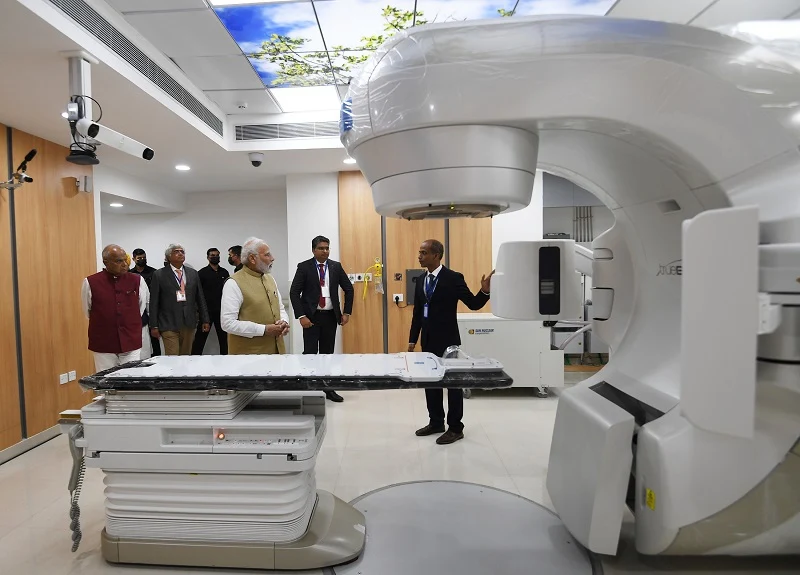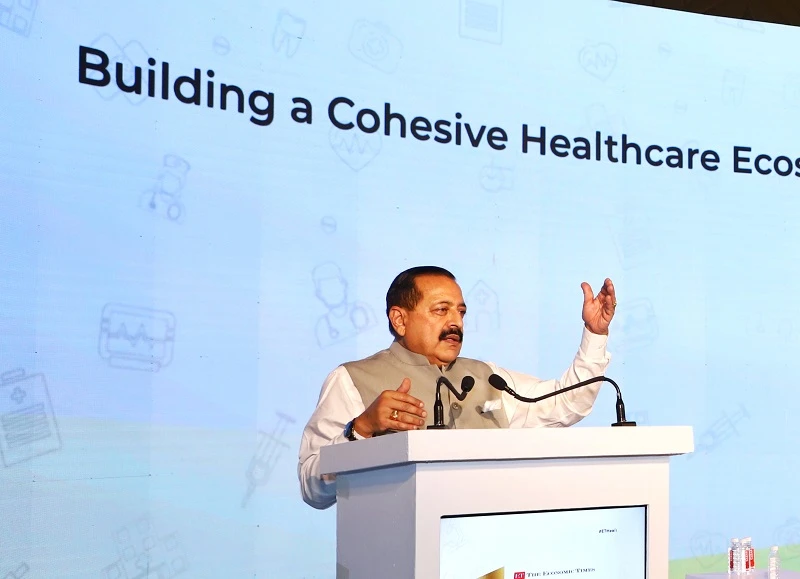

Prime Minister Narendra Modi at the Homi Bhabha Cancer Hospital and Research Centre in Mohali recently (Image courtesy: PIB)
Despite nearly a complete ban on international travel during the Covid-19 pandemic, India issued more than 10 lakh medical visas to foreigners between 2019 and 2022 proving that it is fast emerging as the medical tourism hub of the world.
Addressing a Healthcare Leaders’ Summit on Thursday, Science and Technology Minister Jitendra Singh said that India under Prime Minister Narendra Modi has become one of the world’s most cost-effective healthcare destinations, with the latest technology tools deployed, across care delivery.
India has almost 600 globally and nationally accredited hospitals that provide world-class treatment in a cost-effective manner. The healthcare sector in the country is expected to reach a size of $50 billion by 2025, while the global medical tourism market is estimated to be worth about $72 billion.
Singh revealed that the share of India, already the world’s largest supplier of generic drugs, in medical tourism is expected to be around 10 billion dollars by 2023.
He mentioned that massive efforts are also on building a robust life sciences ecosystem through science and research, which will, in turn, reduce health inequalities and build a clear road map for the continuing successes of vaccines, therapeutics, and diagnostics.
The entire world recognised India’s leadership role during Covid-19 pandemic as it achieved the rare feat of delivering over 220 crore vaccinations through the fully digital platform of COWIN.


Listing the proactive government initiatives, the minister said since PM Modi launched the StartUp India from the ramparts of Red Fort in 2015, India today has more than 80,000 start-ups from around 400 eight years ago.
Prime Minister’s special focus on science, technology and innovation, he said, has fired the imagination of the youth in the country to innovate and solve problems with new ideas and we have startups fast emerging in the fields like IT, agriculture, aviation, education, energy, health and space sectors.
Singh pointed out that at present there are over 4,000 healthtech startups in India spanning from platforms helping to monitor health conditions, apps using AI to detect illnesses and diseases, platforms connecting patients with doctors, and much more and hoped that this ecosystem will grow further and become the leading sector in the world.
He concluded by saying that one can’t visualize India @2047 through the prism of 2022. The Prime Minister, he said, has given India a vision for 2047 and laid the roadmap for the next 25 years of Amrit Kal which would witness the ascent of India as a front-rank nation in the world in terms of the best healthcare system.
Also Read: Moscow conference urges Taliban to rein in terror groups in Afghanistan
The 13th edition of the India-Italy Military Cooperation Group (MCG) meeting was successfully conducted from…
Taiwan's Coast Guard Administration (CGA) issued a strong condemnation of China for supporting illegal fishing…
Naseem Baloch, Chairman of the Baloch National Movement (BNM), appealed for unity among "oppressed nations"…
The Production Linked Incentive (PLI) scheme for telecom and networking has generated export sales exceeding…
Prime Minister Narendra Modi on Saturday reaffirmed India's commitment to conserve water and promote sustainable…
Baloch Human rights leader Mahrang Baloch was arrested by Pakistan's Quetta Police and administration early…